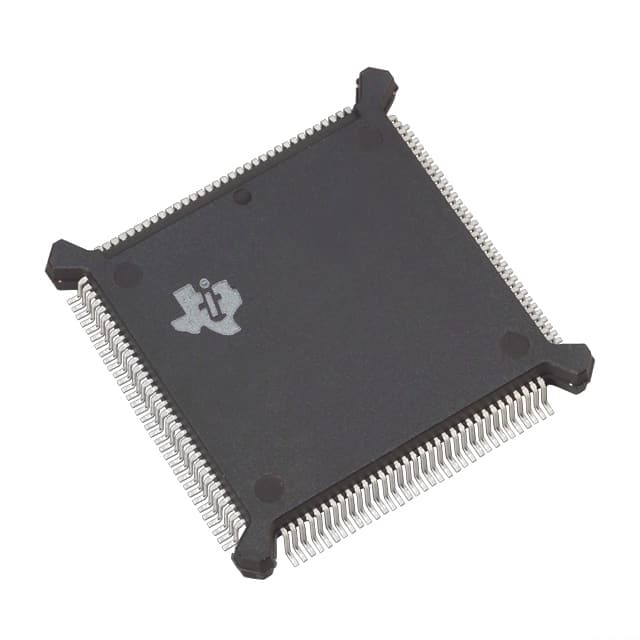Szczegóły produktu można znaleźć w specyfikacjach.

TMS320C31PQL50
Overview
Product Category
TMS320C31PQL50 belongs to the category of digital signal processors (DSPs).
Use
This DSP is commonly used in various applications that require high-performance signal processing, such as audio and video processing, telecommunications, industrial control systems, and medical imaging.
Characteristics
- High-speed processing capabilities
- Efficient execution of complex algorithms
- Low power consumption
- Integrated peripherals for enhanced functionality
- Real-time processing capabilities
Package
TMS320C31PQL50 is available in a 144-pin LQFP (Low Profile Quad Flat Package) package.
Essence
The essence of TMS320C31PQL50 lies in its ability to provide efficient and high-speed signal processing, enabling the development of advanced applications in various fields.
Packaging/Quantity
This DSP is typically sold in reels containing a quantity of 250 units per reel.
Specifications
- Architecture: Harvard architecture
- Clock Speed: 50 MHz
- Data Bus Width: 32 bits
- Instruction Set: Modified Harvard architecture with 16-bit fixed-point instructions
- On-chip Memory: 64 KB program memory, 2 KB data memory
- Operating Voltage: 3.3 V
- Power Dissipation: 1.5 W (typical)
- Operating Temperature Range: -40°C to +85°C
Detailed Pin Configuration
The TMS320C31PQL50 has a total of 144 pins. The pin configuration is as follows:
(Pin diagram goes here)
Functional Features
- High-performance arithmetic logic unit (ALU) for efficient mathematical operations
- Multiple on-chip peripherals, including timers, serial ports, and interrupt controllers
- DMA (Direct Memory Access) controller for efficient data transfer
- Multi-channel buffered serial port (McBSP) for audio and data communication
- External memory interface for expanded storage capabilities
Advantages and Disadvantages
Advantages
- High-speed processing capabilities enable real-time signal processing applications.
- Low power consumption makes it suitable for portable devices.
- Integrated peripherals reduce the need for external components, simplifying system design.
- Efficient execution of complex algorithms allows for advanced signal processing tasks.
Disadvantages
- Limited on-chip memory may require external memory expansion in certain applications.
- Fixed-point arithmetic limits precision compared to floating-point DSPs.
- Availability of alternative models with more advanced features may limit long-term support for this specific model.
Working Principles
TMS320C31PQL50 operates based on the Harvard architecture, which separates program and data memory. It executes instructions from the program memory while fetching data from the data memory. The ALU performs mathematical operations on the data, and the result is stored back in the data memory or transferred to an external device using the integrated peripherals.
Detailed Application Field Plans
TMS320C31PQL50 finds application in various fields, including:
- Audio and Video Processing: Used in audio and video codecs for compression and decompression tasks.
- Telecommunications: Employed in digital modems and voice processing systems.
- Industrial Control Systems: Utilized in control systems for automation and monitoring purposes.
- Medical Imaging: Applied in medical imaging devices for signal processing and analysis.
Detailed and Complete Alternative Models
While TMS320C31PQL50 offers a range of features, there are alternative models available that provide more advanced capabilities. Some notable alternatives include:
- TMS320C32PQL60: Offers higher clock speed and increased on-chip memory.
- TMS320C50PQ57: Provides floating-point arithmetic capabilities for enhanced precision.
- TMS320C6713B: Features a higher clock speed and improved peripherals for advanced applications.
These alternative models cater to specific requirements and offer additional features beyond what TMS320C31PQL50 provides.
In conclusion, TMS320C31PQL50 is a digital signal processor that offers high-speed processing capabilities, low power consumption, and integrated peripherals. It finds application in various fields such as audio and video processing, telecommunications, industrial control systems, and medical imaging. While it has certain limitations, there are alternative models available with more advanced features to suit specific needs.
Wymień 10 typowych pytań i odpowiedzi związanych z zastosowaniem TMS320C31PQL50 w rozwiązaniach technicznych
Sure! Here are 10 common questions and answers related to the application of TMS320C31PQL50 in technical solutions:
Q: What is TMS320C31PQL50? A: TMS320C31PQL50 is a digital signal processor (DSP) chip manufactured by Texas Instruments.
Q: What are the key features of TMS320C31PQL50? A: Some key features include a 32-bit fixed-point DSP core, on-chip memory, multiple I/O interfaces, and high-speed arithmetic operations.
Q: What are the typical applications of TMS320C31PQL50? A: TMS320C31PQL50 is commonly used in applications such as audio processing, telecommunications, motor control, industrial automation, and medical devices.
Q: How much on-chip memory does TMS320C31PQL50 have? A: TMS320C31PQL50 has 16KB of on-chip program memory and 544 words of on-chip data memory.
Q: What are the available I/O interfaces on TMS320C31PQL50? A: TMS320C31PQL50 supports multiple I/O interfaces including UART, SPI, McBSP, and GPIO.
Q: Can TMS320C31PQL50 be programmed using C language? A: Yes, TMS320C31PQL50 can be programmed using C language along with assembly language for optimized performance.
Q: What is the maximum clock frequency of TMS320C31PQL50? A: The maximum clock frequency of TMS320C31PQL50 is 50 MHz.
Q: Does TMS320C31PQL50 support floating-point arithmetic? A: No, TMS320C31PQL50 is a fixed-point DSP and does not have hardware support for floating-point arithmetic.
Q: Can TMS320C31PQL50 be used in real-time applications? A: Yes, TMS320C31PQL50 is designed for real-time processing and can handle time-critical tasks efficiently.
Q: Are there any development tools available for TMS320C31PQL50? A: Yes, Texas Instruments provides a range of development tools including compilers, debuggers, and emulators specifically designed for TMS320C31PQL50.
Please note that the answers provided here are general and may vary depending on specific requirements and implementations.

